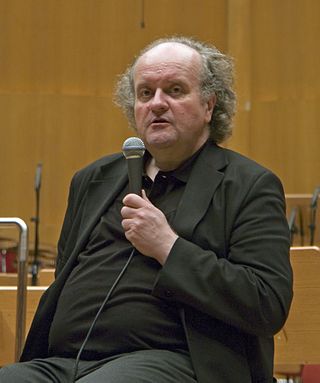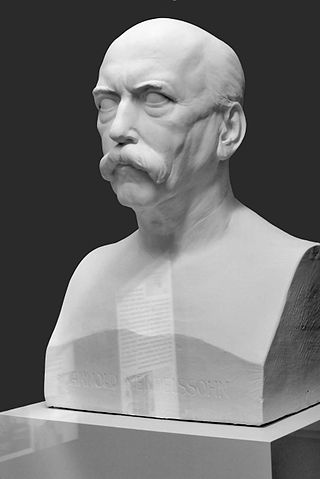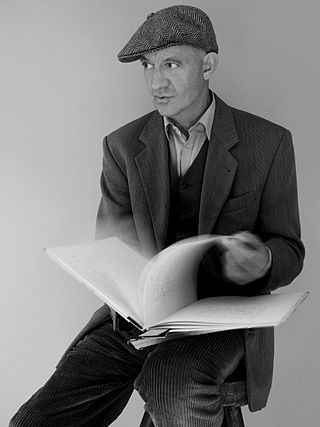Related Research Articles

Stefan Wolpe was a German-Jewish-American composer. He was associated with interdisciplinary modernism, with affiliations ranging from the Bauhaus, Berlin agitprop theater and the kibbutz movement to the Eighth Street Artists' Club, Black Mountain College, and the Darmstadt Summer Courses for New Music. He lived and worked in Berlin (1902–1933) until the Nazi seizure of power forced him to move first to Vienna (1933–34) and Jerusalem (1934–38) before settling in New York City (1938–72). In works such as Battle Piece (1942/1947) and "In a State of Flight" in Enactments for Three Pianos (1953), he responded self-consciously to the circumstances of his uprooted life, a theme he also explored extensively in voluminous diaries, correspondence, and lectures. His densely eclectic music absorbed ideas and idioms from diverse artistic milieus, including post-tonality, bebop, and Arab classical musics.

Wolfgang Rihm is a German composer and academic teacher. He is musical director of the Institute of New Music and Media at the University of Music Karlsruhe and has been composer in residence at the Lucerne Festival and the Salzburg Festival. He was honoured as Officier of the Ordre des Arts et des Lettres in 2001. His musical work includes more than 500 works. In 2012, The Guardian wrote: "enormous output and bewildering variety of styles and sounds".

Bruno Labbadia is a German football manager and former player who played as a striker. He last managed VfB Stuttgart.

The Sonata for Arpeggione and Piano in A minor, D. 821, was written by Franz Schubert in Vienna in November 1824. The sonata is the only substantial composition for the arpeggione extant today. The sonata was composed in November 1824, about a month after he had returned to Vienna from his second stay in Zseliz. It has been adapted to other string instruments, especially the cello.
Wolfgang Fortner was a German composer, composition teacher and conductor.

Arnold Ludwig Mendelssohn, was a German composer and music teacher.
Liza Lim is an Australian composer. Lim writes concert music as well as music theatre and has collaborated with artists on a number of installation and video projects. Her work reflects her interests in Asian ritual culture, the aesthetics of Aboriginal art and shows the influence of non-Western music performance practice.
Ida Ehre was an Austrian-German actor, theatre director, and manager.

Aloys and AlfonsKontarsky were German duo-pianist brothers who were associated with a number of important world premieres of contemporary works. They had an international reputation for performing modern music for two pianists, although they also performed the standard repertoire and they sometimes played separately. They were occasionally joined by their younger brother Bernhard in performances of pieces for three pianos. After suffering a stroke in 1983, Aloys retired from performing.
Elmar Hess is a German artist.

Sandeep Bhagwati is a German composer of western classical music and an academic teacher.
Jürgen Jürgens was a German choral conductor and academic teacher. He founded and directed the Monteverdi-Chor Hamburg, a pioneering ensemble for Monteverdi's music.
Scott Voyles is an American conductor.

Jan Philipp Fürchtegott Reemtsma is a German literary scholar, author, and patron who founded and was the long-term director of the Hamburg Institute for Social Research. Reemtsma lives and works mainly in Hamburg.

Hermann Kauffmann also Herrmann Kauffmann was a German painter and lithographer, and one of the main representatives of the Hamburger Schule.

Natias Neutert is a German artist, author, poet, orator, and translator who lives in Hamburg and Berlin.
Silke Leopold is a German musicologist and university lecturer.

Wolfgang Steinecke was a German musicologist, music critic, and cultural politician. In Darmstadt, he revived cultural life after World War II, especially by initiating the Darmstädter Ferienkurse, which connected Germany to the international scene of contemporary music.

Martin Bonnet is a German engineer and university professor. He is managing director of the Institute for Applied Materials at the Cologne University of Applied Sciences where he also teaches materials science.
Klaus Storck was a German cellist who appeared internationally as soloist and chamber musician. He also edited music for cello. He often appeared in a duo with his wife, the harpist Helga Storck, and composers wrote music for them.
References
- ↑ Der Arpeggione with Gerhart Darmstadt
- ↑ Der Arpeggione on AllMusic
- ↑ [https://web.archive.org/web/20140709074801/http://hh-mittendrin.de/2014/07/sperrfrist-07-07-15-uhr-wissenschaftssenatorin-verleiht-6-hamburger-lehrpreis/ Wissenschaftssenatorin verleiht 6. Hamburger Lehrpreis]
- ↑ Sonate pour arpeggione et piano with Gerhart Darmstadt on Schott music
- ↑ Prof. Gerhart Darmstadt on hfmt-hamburg